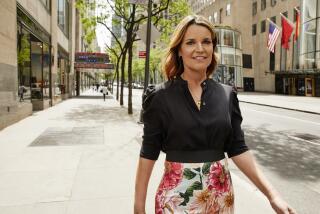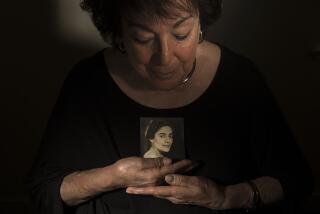A Kiss, a Hug Dent the Armor of a Professional
- Share via
It shouldn’t have startled me so, this kiss from a near-stranger.
When this 88-year-old grandmother cupped my face in her hands, her fingers were as smooth as flower petals. When she embraced me and kissed my cheek, she murmured, “God love you and keep you.”
But with her gentleness and sudden intimacy, Mary McAnena shattered my professional composure, toppled the little emotional wall that usually keeps me at a safe, cool distance from people I write about.
I had come to talk to Mary McAnena about her aid to the unfortunate. Every weekday for five years, the Irish-born widow has fed lunch to a growing legion of homeless people in nearby W.O. Hart Park.
And now, despite many commendations for her work, she has become something of a pariah. Neighbors and city officials want McAnena and the homeless out of the park. A recent spate of hateful letters and phone calls has pierced her heart with fear.
But none of this has changed her. She goes on cooking lunches. Her manner is warm, even effusive. On the porch of her little white house, she squeezes my hand in greeting, even before she knows my name.
As we sit on her couch, McAnena says that despite the growing resentment toward her work with the homeless, she has no doubts about what she’s doing, and doesn’t worry about her own well-being. With a roof over her head and food to eat, McAnena feels fortunate enough to help those in need. A devout Catholic, she has unwavering faith that God will take care of her.
Unwavering faith. As I listen to McAnena, I know that I have unwavering faith in next to nothing. In Mary’s world view, there is peace and confidence because things happen for a reason. There is love because there is God.
In mine, where logic crowds out spirituality, the world’s events are often baffling and unfair, a cruel challenge to any belief in happy endings. Too often, life’s daily burdens seem heavy and its dangers frighteningly close. The only thing to do, it seems, is hold them at bay. Somehow.
To do this at work, reporters develop the skill--or perfect the act--of maintaining emotional distance. We can’t afford to wince as we survey a tarmac strewn with bodies after a plane wreck, or choke up as we interview a mother whose child was killed.
But keeping emotional distance doesn’t stop when the workday ends. The late news devotes a few seconds to the murders of the day, then moves on to the deadly floodwaters, the train wrecks and abducted children. As my baby daughter sleeps down the hall, I resolve silently to hold every dangerous thing far away from her forever.
And so it is that I understand the building of mental and emotional walls. They help me keep a perspective as I report on people and events. They seem to protect me and my loved ones from threatening things. And they allow me to believe, for a self-delusional moment anyway, that life is safe and that maybe there really are happy endings.
But meeting someone like Mary McAnena brings into question the benefits of self-protection. I marvel that in such a selfish and complicated age, one woman would open herself up to the daily sufferings of so many and worry so little about herself.
And I, less than half her age, am wearing 10 times her emotional armor.
That is why I’ve been thinking about what we lose when we try so hard to keep life’s painful things at arm’s distance. And that is why, when she embraced and kissed me in parting, telling me never to forget how precious my husband and daughter are to me, I could only nod, unable to find my voice to answer.


